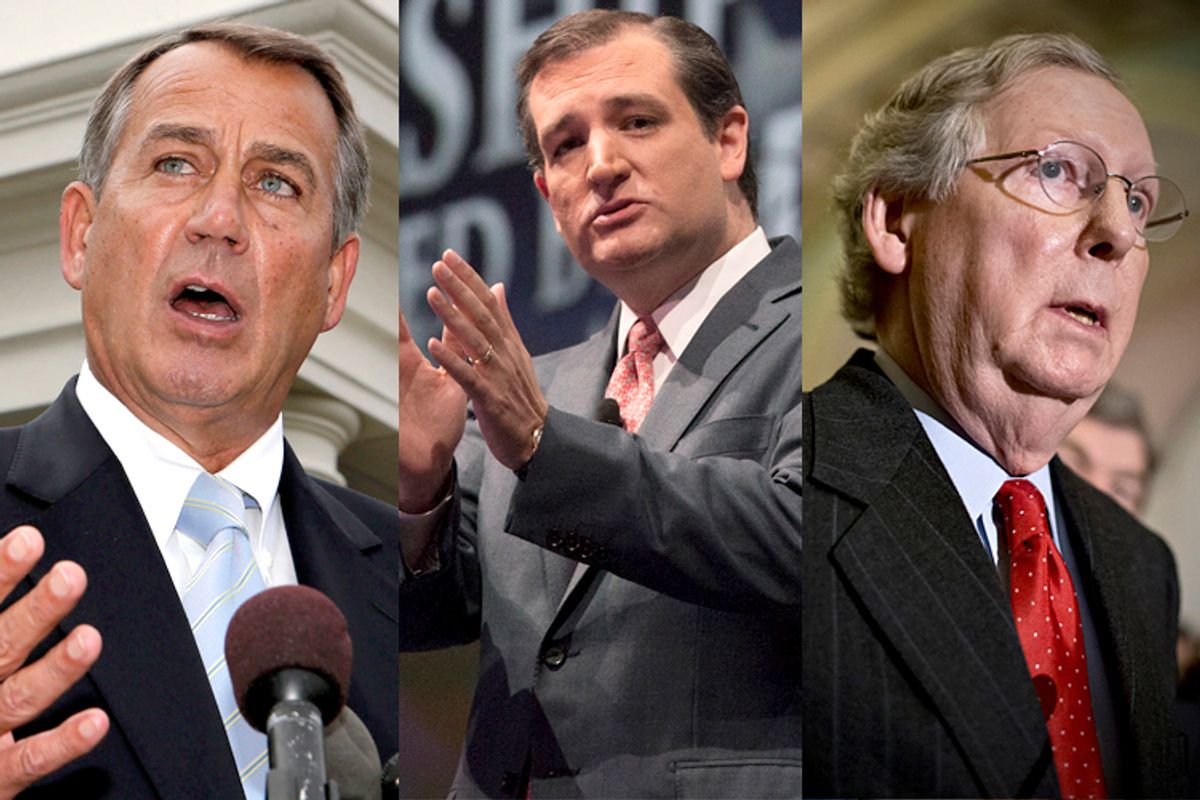Back in late March of 2010, Rihanna and Bruno Mars were at the top of the Billboard charts, "The Hurt Locker" had just won the Oscar for best film, and Sony Music sold the rights to Michael Jackson’s music catalog. Also, the United States was spending almost $1 trillion more per year on healthcare than other developed nations, but for poorer health outcomes. Medical costs were skyrocketing, threatening to double premiums within just a few years. Almost two-thirds of bankruptcy filings in the country were due to medical debt, though most of those affected nonetheless had health insurance. And over 45 million Americans lacked any health insurance coverage whatsoever.
As the nation rehashes the pros and cons of Obamacare while the increasingly popular law takes wider effect and Republicans grasp for political straws, it’s important not just to note the effects that the Affordable Care Act is having today but the very real and urgent problems it addressed in the first place.
If Republicans want to get rid of Obamacare, they'll have to reckon with the alternative.
In 2009, while the Affordable Care Act was being debated, 14,000 Americans were losing their health insurance every day. If nothing changed, it was projected that 72 million Americans would lack health insurance by 2040. Insurance premiums were already rising three times faster than wages (and wages weren’t that great). And those of us who could still afford health insurance were carrying the load for those who could not — each of us paying a hidden $1,000 tax to cover the expensive emergency room care of the uninsured. These costs were unchecked and unregulated. And if they kept rising, not only would private insurance become even less affordable but Medicare and Medicaid costs would balloon at a significant cost to other government services. Healthcare costs were 18 percent of our GDP in 2009. Without action, they were expected to comprise 34 percent of our GDP by 2040.
As a community organizer in the summer of 2009, I traveled to rural congressional districts across the United States to try and understand the healthcare crisis and find ordinary Americans whose stories made the case for extraordinary reform. I met small-business owners who had to shut their doors because of runaway healthcare costs. I met young mothers with massive health problems and piles of healthcare bills almost as massive. I met retirees scared about their health and their savings. People from all walks of life, but facing the same monumental challenge.
The person who stuck with me most was Chris, a young father from Rolla, Mo. When we spoke, he was recently diagnosed with cancer and, even though he had insurance, he had over $16,000 in unpaid medical bills. Chris couldn’t afford to pay his own insurance and get coverage for his daughter and often thought about dropping his own coverage — and stopping his medical care — so he could protect his daughter. Chris tears up talking about what it means to not be able to care for his daughter. No father, no family should be put in that situation. But it’s precisely the crisis that millions of American families faced, or were threatened with facing, before Obamacare.
The Affordable Care Act passed by Congress and the president may not be perfect. Complex solutions to complex problems are rarely perfect right from the outset, which is why it’s appropriate to take time with the law’s rollout. But the consequence of inaction would have plainly been disastrous. America was reeling from a healthcare crisis that was only about to get worse. Change was needed. Leadership was needed. Those who continue to complain about Obamacare mainly want to drag down the president, not participate in the constructive process of healing America’s healthcare crisis. After all, other than the individual mandate, which President Obama adopted in his reform law, Republicans have offered no other concrete policy alternative. Instead of participating in problem solving, apparently the only thing Republicans know how to construct is a partisan crisis.
Today, hundreds of millions of Americans already have more affordable and more reliable, quality healthcare thanks to Obamacare. And that was even before the main part of the law, the state-based health insurance exchange markets, took effect. Soon, millions more Americans — yes, myself included — will take advantage of an expanded, competitive private insurance market that offers more affordability and choice in coverage. The cost of insurance for all Americans will continue to go down while access to insurance and healthcare goes up. And while we will certainly still have inadequacies and inequalities in our healthcare system, the future of quality, affordable care in America will be brighter and nothing like the dark days of the past. In fact, the only thing that will be the same as in 2009 will be the broken record of Republican complaints and critiques.

Shares